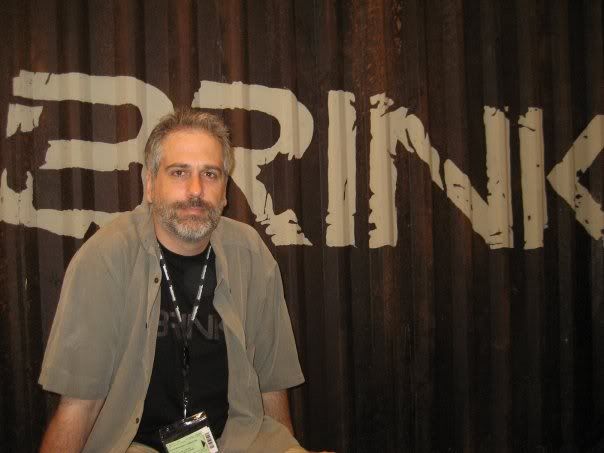 BRINK turns out to be a lot more than just a regular shooter. The research behind the game – yes, there was research – turns out to actually be valid. Richard Ham and Edward Stern talk to Snezana about the actual scientific methods behind BRINK, the motivations behind the game, and about the game itself.
BRINK turns out to be a lot more than just a regular shooter. The research behind the game – yes, there was research – turns out to actually be valid. Richard Ham and Edward Stern talk to Snezana about the actual scientific methods behind BRINK, the motivations behind the game, and about the game itself.
Snezana: Tell us something more about BRINK. All we know is that it all happens on the Ark, an immense artificial floating city, on the brink of civil war.
Richard: “Well, right around now, somewhere between 2000 and 2010, the Ark project began. And it was basically an attempt to make a prototype city that proves that mankind can live in harmony with nature, a complete green way of life. We’ve actually done a ton of research into what would be involved with actually creating something like the Ark.
The one bit of science fiction that we actually created was something we called ARCORAL, which is a genetically modified coral, which they used as a building material because it was very strong, very light.”
Edward: “Concrete emits carbon dioxide, which is a big problem in construction (Read more about this here: http://www.greenharbor.org/2009/08/new-green-concrete-absorbs-carbon-dioxide/). And in our story, the Ark project is one of the first pieces of technology in which they try to use it [the genetically modified coral] as construction material. It’s not quite sci-fi, because it’s based on truths.”
Richard: “So we actually have this little bit of science fiction, this notion about a new, green, better concrete. But it had a huge impact on the world that exists. But now, they’ve invented it. They have created a green concrete. That was our last piece of science fiction, and that’s gone too. It’s not really genetically modified coral, of course.”
Edward: “No, its concrete that traps carbon dioxide. It’s transparent, it’s more expensive, but it exists.”
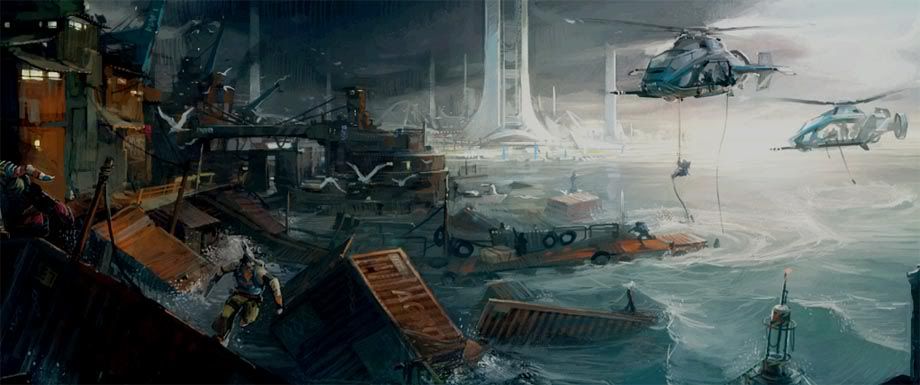 Snezana: So the Ark is actually possible?
Snezana: So the Ark is actually possible?
Richard: “Exactly, to me that’s the amazing thing. I came in six months into the project. And at first I thought, wow, this is crazy science fiction. But as I got more into it, I saw that this is really very grounded into what is happening today, so it’s really a very topical game.
So that was the origin and the inspiration of what the Ark was all about, and so they actually succeeded. By 2010 they actually had something put together [the Ark], it became one of the higher wonders of the world. It became like an international bastion of research. Everything was going great, until the flooding started. The worst of an inconvenient truth came to pass. And practically overnight, hundreds of millions of people all over the worlds were being displaced. And the biggest mistake the makers of the Ark made, was opening their doors to all those refugees. And allowing them to come in. They did it because that was the point of the Ark, it was supposed to be the salvation of mankind.”
Edward: “When the game starts we jump to 2045. And basically they haven’t had any contact with the outside world for about ten years.”
Richard: “An entire generation is now grown up inside this space that was originally meant to house about 5.000 people, in the game there’s about 50.000 people in there.”
Edward: “And just as in real life, neither money or resources or technology or space is distributed evenly throughout society. So you’ve got the founders, who still live in these beautiful houses. You’ve also got the refugees, who’ve taken over the contending zone. They’ve turned the automated shipping facility into the biggest slum.
Absolutely it’s a shooter, you run around shooting things. And you can’t put blocks of back story or social concerns in the way of players, because they know when they’re being lectured at. So the challenge was to have enough going on so it’s not just plain old team A or team B in the red arena, but to have a genuine sense of place. Like in literature, when you turn the page to see if the character still lives. And great characters live on in our imagination. This is one of the goals of the Ark. It’s more than just the maps we get to see in the game. We’ve certainly done the work in terms of the research and the back story. Look at Bioshock, I’ve played that game as slowly as possible, because they’ve really taken the time and trouble to create this entire world. And that’s what we want with the Ark. Rather than a pre-rendered video or an NPC, stopping you from playing the game that you’ve paid for, to tell you what is going on, you should be able to just look around you and use the environment to see what’s going on.
The choice of faction means something as well. We’ve got two teams: the Resistance and the Security. And it’s not quite as simple as the rich ones and the poor ones.”
Richard: “But that’s how each side looks at it, in those black and white terms. But the reality of our world is that it’s not as simple as that. Again, we’re not trying to get on a soap box and preach about how to save mankind. But we are infusing themes that are pretty much our personal opinions about what has actually happened to society, why we are who we are. Why the fans of one football team will beat the crap out of another football team, just for football.”
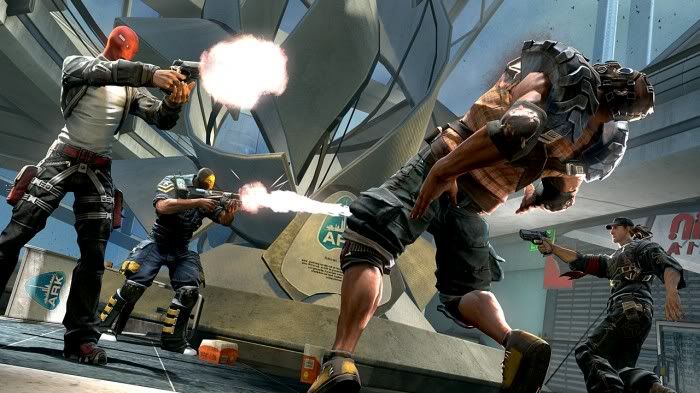 Snezana: Obviously, you both have quite a complex motivation for working on this game?
Snezana: Obviously, you both have quite a complex motivation for working on this game?
Richard: “Well that’s pretty much a big part of what Ed is working on. First and foremost, we are a multiplayer shooter. Which traditionally, when you look at Battlefield for example, there is no real narrative structure that ties it all together. You’re just having fun.”
Edward: “Mostly when people think about singleplayer, there is a story. There’s a linear chain of events, and your actions affect them. Now we don’t have a solo singleplayer mode. It’s not like you are James Bond against thousands of baddies attacking you for no good reason. It’s not an enormous barbarian army against another enormous barbarian army. It’s always a small raid, and it’s about the right kind of side. And we really wanted the choice of faction to mean something. Not just evil empire, heroic rebels. We wanted to make it more complex, ambiguous, ambivalent.
Snezana: So in fact, you’ve tried to recreate life’s complexity in BRINK, by optimally utilizing the possibilities that games have to offer as a medium?
Edward: Yes, and that’s what life is about. In real life, no one agrees on what’s going on and what’s right. Why should that suddenly become true in games? ‘Oh yes, we all agree that this is the cause of this!’ Why? When in human history has this ever been true? And deliberately, it’s an excuse to import every social, political and economic tension from the real world into this very, very restricted world. Literally, they do not have any extra space, it’s an island. They’re in the middle of the sea, and they’re running short of technology. All the technology, it works perfectly for a while, but what happens when it all stops working?”
Richard: “Answer: people start killing other people.”
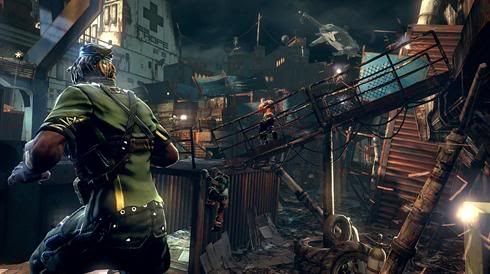 Snezana: How have you made sure that this narrative aspect is entangled within the game play, without boring the player too much with endless storylines?
Snezana: How have you made sure that this narrative aspect is entangled within the game play, without boring the player too much with endless storylines?
Edward: “As you look around you, you will get the story if you want to. And we’d much rather let the player pull that information from the environment rather than push it at them. But next to that it’s absolutely a solid shooter experience. It’s kind of like a narrative alibi. Why exactly are we shooting each other? Each map has a beginning, middle and an end. So each map has a story, but the campaign in itself also has a story. So if you play as the Security, you will not be learning everything about the Ark. If you then play as Resistance, you will see a very different turn of events.”
Richard: “And the truth is somewhere in-between the two. There’s truth and false on both sides. And if you play both sides, the game leaves it up to you to decide who was right and who was wrong. If you’re into it. If not, you can just keep playing and have fun shooting as well. We’ve been around a while; we both have something to say. And as cheesy as it sounds, I do believe videogames are an art form and that as artists we do have an opportunity to actually express ourselves and it’s really exciting and something that is important to us.”
Snezana: When you’re playing the game, do any suspicions arise with the player, that he / she might actually be doing a mission for the wrong reasons?
Richard: “It’s always been the case in mission briefing. Why wouldn’t your commanders lie to you, or at least stretch the truth? And sometimes it’s just a case of not knowing for sure, but not being able to take that chance.
Edward: “And this strikes me as a much more realistic scenario. There are very few games when I’m like, ‘oh wow, I genuinely don’t know what to think’. There are goodies and baddies and of course you kill the aliens, because that’s what you do.”
Richard: “There are no aliens in the game.” *laughs*
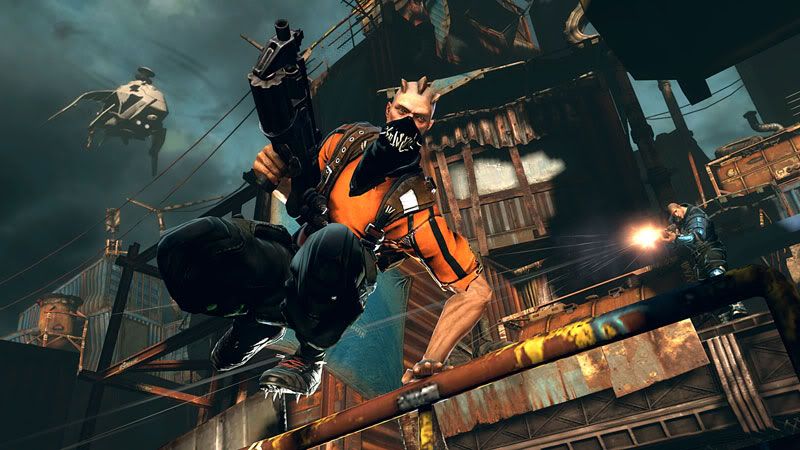 It’s all very grounded. We’re trying to do something that actually has some kind of meaning, if the players want to see it. They can skip the cut scenes, or fill in the back-story. The interesting thing about us putting all this narrative in the game is that we are a multiplayer shooter. It’s very traditional in every multiplayer shooter, that when you join the server, there’s that 20 seconds to a minute where everybody is logging in and choosing their weapons. And every match, you always have to wait. And games never take advantage of that by using it as a platform. We take advantage of that by using it to tell our story. Actually, in the background there’s a cut scene that’s actually establishing how your teammates feel about the fact that they’re about to kick in some poor old lady’s door to get into the bomb factory.
It’s all very grounded. We’re trying to do something that actually has some kind of meaning, if the players want to see it. They can skip the cut scenes, or fill in the back-story. The interesting thing about us putting all this narrative in the game is that we are a multiplayer shooter. It’s very traditional in every multiplayer shooter, that when you join the server, there’s that 20 seconds to a minute where everybody is logging in and choosing their weapons. And every match, you always have to wait. And games never take advantage of that by using it as a platform. We take advantage of that by using it to tell our story. Actually, in the background there’s a cut scene that’s actually establishing how your teammates feel about the fact that they’re about to kick in some poor old lady’s door to get into the bomb factory.
There’s always the core objective that your team has to focus on to win. And the majority of the players, mainly the really hardcore guys, they’re on the frontline working that. You might find that you can’t keep up or aren’t really comfortable over there and wonder, ‘what other options do I have?’ And there will be objectives for you to do that really encourage you to explore, to find collectibles, to find enemy command posts, that take you away from the frontline. And if you succeed at those [dynamic objectives], you will still be helping your team.
Snezana: BRINK has a so-called ‘instant co-op’ option. Can you tell us more about how that works?
Edward: “The most fun and the worst fun we’ve ever had has been with online gaming. When a team is working really well with each other, it’s fantastic. Also, when it doesn’t work, and you’re just being shouted at by people who you have no idea who they are, it’s no fun at all.
So imagine you’re playing through the [Ark's] singleplayer storyline. Then I come online and I see you and ask ‘Oh, can I join you?’ and you accept, I join, and I replace one of the AI players. Within one frame of the game. I go offline, the game immediately goes back to a singleplayer experience and I’m replaced by an AI. If you replace all of the AI players, it’s an online multiplayer.”
“And there’s absolutely no concessions made when it comes to graphical differences in singleplayer and multiplayer. They both look just as great.
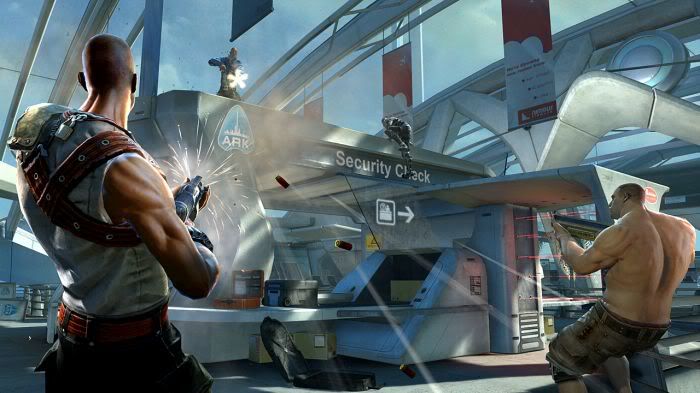 — interruption by PR lady –
— interruption by PR lady –
Richard: “One of us is going off, who would you like to stay? Who’s you’re favourite?”
Edward: “I choose you, Pikachu!”
Snezana: Well, who’s more like Pikachu?
Edward: “Okay, I’ll leave then. Don’t believe a word this man says.”
Snezana: So you’re sneaking in a message, why have you specifically chosen to sneak it into?
`Yeah, we’re pretty much sneaking it in. I shouldn’t say bad things, but we’re not like for example Metal Gear Solid. It literally has a half-hour lecture about how terrible it is that people have nuclear weapons. Yeah, okay. I get it, it’s a terrible thing. Can I get back to the game now, please? So we’re really conscious of that. It’s a fine line. It’s something I worked on quite a bit with Fable as well. On the surface, Fable is really simple. It’s about making choices, black and white, about morality. And for then most part when you’re on the main storyline of the game, you’re just presented with very simple choices. But in a lot of the optional side-quests, we were doing much more interesting stuff. One of my favourites there was actually when you went to this farm, and there was this guy who was having problems with his son. And the son says: “Well, I’m just having a hard time finding a girl.” And when you talk to him, you find out that he’s in the closet, that he’s gay. And he just hasn’t been able to tell his father that. And so you choose whether to go out and find him the perfect girl or the perfect guy, and bring one of those back so that he can go on a date. Obviously, in doing that you can change his life.
And to me, that is really exciting. And it’s the same thing we’re trying to do here. One team sees it in one way, the other sees it in a completely different way. But both teams are completely right from their point of view.
And there are those kinds of real world parallels (like Israel and Palestine) that your average 20-year old game-fan does not spend any time thinking about. And we’re not going to change the world with our game or anything, but it’s just something that we want to put into the back of their heads.
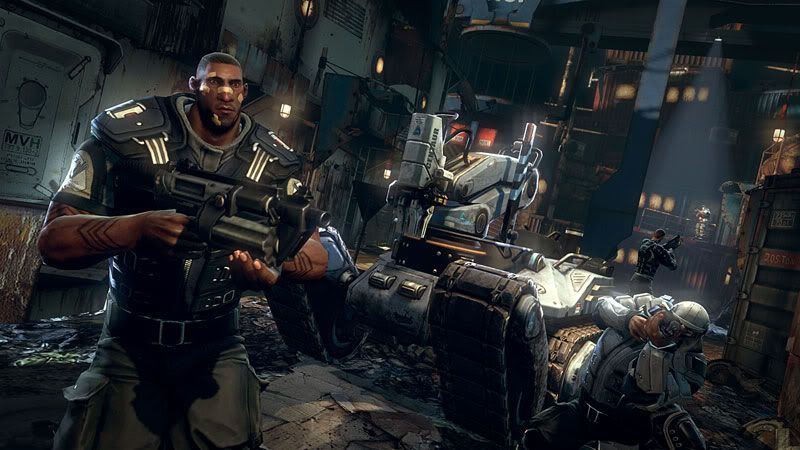 Snezana: Well, let’s talk about something completely different: the game. For now, let’s talk about the art style. A lot of references were made to the released screenshots looking ‘cartoony’.
Snezana: Well, let’s talk about something completely different: the game. For now, let’s talk about the art style. A lot of references were made to the released screenshots looking ‘cartoony’.
Richard: “First of all, the screenshots are 100 percent real taken from the game. There are no Photoshop filters, or cleaning of the shadows or anything. Our Media Director, Richard Jolly, spent a lot of time with the games, in-game, to actually raise these moments where everything is just right and you can grab that [screen]shot. So the shots are directly from the game, not touched at all. Some people say there’s no way they can possibly be real. Well, they are real. And we’re very proud of that.
As for the actual look, you said ‘cartoony’, and that’s actually something that drives Olivier Leonardi, our art director, a little nuts. And Olivier can only describe it in French. So I can’t really come here and say what it should be. But it is certainly stylized and exaggerated.
It was one of the reasons Ark was chosen as an environment. Paul Wedgewood wanted to accomplish a couple of things.
One, he wanted to create a game that everybody just immediately could put themselves into. And most games these days do that by setting it in the real world. Which is great and fantastic, but we didn’t want to do that. But we still wanted the player to be able to put himself into that world. Do something that is really recognizable. Which is why the setting of the Ark is now. It is inspired by really some of the stuff you see in Dubai, and like someone has all the money in the world and they can make this kind of perfect realization of mankind’s goals. And that’s expressed through architecture. So that is kind of where the Ark came from.
Back to cartoon graphics. Our lead character guy Tim Appleby, who came to us from Bioware. He started talking with Olivier, and we really wanted something that grasps people’s attention that doesn’t look like anything else out there. I really hope we will get to release some of our original concept art, cause when you look at them, they are really art.
But converting it to 3D is a huge task. Our character team had a really hard time nailing it, because it’s so easy to go a little bit too far, and then they kind of become ridiculous.”
Snezana: I read an article that dealt with an issue around BRINK, saying “BRINK isn’t for homophobes.” What was that all about?
“It isn’t. Well actually, I’m kind of stupid. In that, I’m playing a kind of risky game. I’m actually going on YouTube and talking to people who are excited about the game and trying to see what they like and what they don’t like. And it’s obviously been drawing a lot of attention that people are saying “Yeah, this game is for fags”. And then I think, I don’t mind that you’re not excited about the game, cause I don’t want you to play the game. We don’t need your money.”
Snezana: What is your personal experience with online gaming, and can you tell us something about how the teamwork in BRINK differs from standard multiplayer chaotic game chatter?
Before I came to Splash Damage, I used to play Call of Duty all through, solo. And they I’d be done with it, I’d put it on a shelf. I would never actually take the time to go online and so this huge amount of game experience was completely lost to me. So to me, a big goal is ensuring that players like me, who are missing out on these kinds of experiences, are comfortable and invited in.
In BRINK, we actually literally invite you to come online. We can guarantee you that you will never hear the voice of someone who isn’t already your friend.
Now, for years on PC it was very hard to do voice communication. But on consoles, it’s really easy because it’s all built in the hardware and we have this wireless mics. So you go online to play Halo and it’s just a cesspool of foul language because it’s just so easy, there’s no barrier.
So by default, [in BRINK] all the voice chatter is turned off. And that’s a dangerous thing, because it means that if you and I are playing together and I see you’re about to be shot in the back, I can’t warn you. Again, it could if we were friends and were using the party channels. But if you’re a stranger and I wanted to help you, there’s nothing I can do. There’s a big focus in our development on working on a very robust automatic chat system. So the game can do it for you. The system very smartly recognizes what you are doing and what I am doing. And if there’s something really important you need to know, my character will speak in the language of the game about that situation. And by doing this, we create a game where players can really have that game experience that people normally don’t have, because everybody’s pretty much just running around calling everybody a fag.”















Great interview, I like their stance regarding the commenter idiots from youtube especially.
“It’s not quite sci-fi, because it’s based on truths.”
Say what now? Any author of hard science fiction bases his or her work on scientific truths, and extrapolates from knowns to fill in any unknowns. Even sci-fi based on the more abstruse theories such as string theory always is grounded within a scientific truth — a theory which is considered the best current explanation for a phenomenon, or at least one that is a viable explanation.
I don’t know if this is real ignorance, or just a cultural thing — when attending several science fiction writing workshops, I was made aware that many other cultures have less savory views of science fiction, often considering it synonymous with things like fantasy literature or even comic books. These views are quite common in some parts of Europe. In the United States, on the other hand, the worst attitude I’ve ever come across is “science fiction is young adult fiction,” the notion that adults should not read sci-fi.
These guys get an A for the conceptual effort put into the game, but with off-the-cuff comments like the one I quoted above, I worry that these elements will either not be rendered credibly in the game, or they’ll be mere window dressing that has no impact on the game mechanics whatsoever.
For example, there was this in the interview:
Snezana: So the Ark is actually possible?
Richard: Exactly, to me that’s the amazing thing. I came in six months into the project. And at first I thought, wow, this is crazy science fiction. But as I got more into it, I saw that this is really very grounded into what is happening today, so it’s really a very topical game.
Gee, that’s pretty telling. “Crazy science fiction” apparently means “nobody wants to buy it or play it,” but if you can put a contemporary spin on it, people eat it up. Of course, Gene Roddenberry figured this out years ago with his whole “wagon train to the stars” schtick, and the Star Trek stories were often about Cold War tensions and other issues of the day, but sci-fi has always been a safe lens to look at thorny social problems we face.
Still, though… Is it that the developers and suits feel the need to bash a genre just so they can appeal to fans of hard core shooters?
Is it ignorance or oblivious thought that leads you to defend the merits of science fiction as a legitimate interest while saying comics and fantasy fiction are not to be taken seriously. I mean, really?
Of course it won`t have any serious impact on shooter mechanics, Robbert.
SD already had that experience with Quake Wars where some,let us say, narrow-minded people coudn`t play on alien side only because it was not completely symmetric to human side, situation they got used to in gazillion other shooters.
Certainly, they don`t want to gambe on that anymore.
the game so far looks amazing but I just need some clarification on the communication is it all just chat system or can you talk like you would in cod too.
You can actually talk like in COD, you just won’t get random chatter but you will only hear the people you choose to hear.